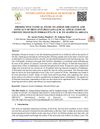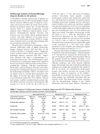 3 citations,
January 2017 in “Journal of Pakistan Association of Dermatology”
3 citations,
January 2017 in “Journal of Pakistan Association of Dermatology” Women with certain types of hair loss may have low iron levels, and iron supplements could help.
 3 citations,
May 2010 in “Nursing Standard”
3 citations,
May 2010 in “Nursing Standard” Treatments for autoimmune hair loss have limited success and often relapse, and emotional support is crucial for those affected.
 3 citations,
November 2009 in “BMC dermatology”
3 citations,
November 2009 in “BMC dermatology” Dermatologists' treatment of alopecia areata is inconsistent, especially for children and advanced stages.
 1 citations,
December 2017 in “The journal of investigative dermatology. Symposium proceedings/The Journal of investigative dermatology symposium proceedings”
1 citations,
December 2017 in “The journal of investigative dermatology. Symposium proceedings/The Journal of investigative dermatology symposium proceedings” Treating alopecia areata is difficult due to limited approved treatments, but new therapies like JAK inhibitors show promise.
 April 2024 in “Frontiers in medicine”
April 2024 in “Frontiers in medicine” Alopecia Areata significantly lowers quality of life and current treatments are inadequate, highlighting a need for better therapies and standardized treatment protocols.
 February 2024 in “International neuropsychiatric disease journal”
February 2024 in “International neuropsychiatric disease journal” Alopecia areata severely impacts quality of life, mental health, and work productivity.
 January 2024 in “Dermatology practical & conceptual”
January 2024 in “Dermatology practical & conceptual” Atopic dermatitis in kids with alopecia areata can predict poor response to topical immunotherapy.
 December 2023 in “EPRA international journal of multidisciplinary research”
December 2023 in “EPRA international journal of multidisciplinary research” Alopecia areata causes sudden hair loss, has genetic links, and can be managed but not cured.
 October 2023 in “Frontiers in medicine”
October 2023 in “Frontiers in medicine” Comprehensive screening for infections is crucial before starting JAK inhibitors in alopecia areata patients.
 October 2023 in “International journal of biology, pharmacy and allied sciences”
October 2023 in “International journal of biology, pharmacy and allied sciences” Personalized treatment plans combining natural and synthetic approaches are important for managing alopecia effectively.
 September 2023 in “Medical and Clinical Case Reports”
September 2023 in “Medical and Clinical Case Reports” People with Alopecia Areata often have thyroid problems like Hashimoto thyroiditis and hypothyroidism.
 June 2023 in “Buletin de psihiatrie integrativă”
June 2023 in “Buletin de psihiatrie integrativă” Alopecia causes significant emotional distress and psychological issues, requiring combined skin and mental health treatment.
 April 2022 in “Research Square (Research Square)”
April 2022 in “Research Square (Research Square)” The combination of laser and topical steroids is more effective for treating alopecia areata than topical steroids alone.
 October 2020 in “Revista médica sinergía/Revista médica sinergia”
October 2020 in “Revista médica sinergía/Revista médica sinergia” Alopecia areata is a complex condition causing hair loss, linked to genetics and immune system issues, and may be related to other autoimmune diseases; treatments vary in effectiveness.
 July 2019 in “The European research journal”
July 2019 in “The European research journal” RDW can be a useful marker for inflammation in alopecia areata patients.
 July 2018 in “International journal of research - granthaalayah”
July 2018 in “International journal of research - granthaalayah” Croton tiglium application significantly improved hair regrowth in alopecia areata patients.
 January 2018 in “Elsevier eBooks”
January 2018 in “Elsevier eBooks” The document concludes that alopecia has significant social and psychological effects, leading to a market for hair loss treatments.
 January 2015 in “Journal of evolution of medical and dental sciences”
January 2015 in “Journal of evolution of medical and dental sciences” Topical tacrolimus is effective and safe for treating alopecia areata.
 May 2003 in “Facial Plastic Surgery Clinics of North America”
May 2003 in “Facial Plastic Surgery Clinics of North America” Hair loss can be treated with medications like minoxidil and finasteride or surgery, but treatment effectiveness varies by alopecia type and accurate diagnosis is important.

Topical corticosteroid treatment showed no significant difference from placebo in treating alopecia areata in children.
 4 citations,
May 2021 in “Lasers in Surgery and Medicine”
4 citations,
May 2021 in “Lasers in Surgery and Medicine” Light therapy reduces scalp inflammation, boosts hair regrowth with Minoxidil 2%.
 46 citations,
January 2015 in “Journal of The American Academy of Dermatology”
46 citations,
January 2015 in “Journal of The American Academy of Dermatology” Trichoscopy helps diagnose and assess the severity of Frontal Fibrosing Alopecia.
 40 citations,
August 2018 in “Skin appendage disorders”
40 citations,
August 2018 in “Skin appendage disorders” Some alternative treatments for hair loss might work, but more research is needed.
 May 1993 in “Medical Clinics of North America”
May 1993 in “Medical Clinics of North America” Surgical hair replacement is a viable option for male pattern baldness when done with proper planning and realistic expectations.
 29 citations,
September 2012 in “Dermatologic Clinics”
29 citations,
September 2012 in “Dermatologic Clinics” Hair disorders are caused by a complex mix of biology, genetics, hormones, and environmental factors, affecting hair growth and leading to conditions like alopecia.
 8 citations,
January 1989 in “Annual Reports in Medicinal Chemistry”
8 citations,
January 1989 in “Annual Reports in Medicinal Chemistry” Hair loss from alopecia areata and androgenetic alopecia can be treated, but more effective and safer treatments are needed.
 19 citations,
October 2020 in “Journal der Deutschen Dermatologischen Gesellschaft”
19 citations,
October 2020 in “Journal der Deutschen Dermatologischen Gesellschaft” Hair loss can lead to significant stigma and lower quality of life, especially for women and those with certain types of alopecia.
 December 2023 in “Journal of dermatology”
December 2023 in “Journal of dermatology” Adults and adolescents with severe alopecia areata are willing to take significant health risks for a better chance of hair regrowth.
13 citations,
January 2017 in “Annals of dermatology/Annals of Dermatology” Simvastatin/ezetimibe may help some patients with severe alopecia areata regrow hair.
7 citations,
November 2018 in “British Journal of Dermatology” Alopecia areata is caused by immune system issues, and JAK inhibitors might help treat it.




























